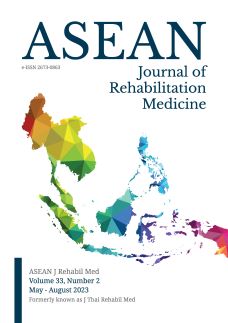The Multiple Mini-Interview for Physical and Rehabilitation Medicine Residency Admissions: Reliability and Acceptability
Keywords:
interview, physical and rehabilitation medicine, internship and residency, medical educationAbstract
Objectives: To evaluate the reliability and acceptability of using the multiple mini-interview (MMI) for Physical and Rehabilitation Medicine in the residency admission selection process.
Study design: A retrospective cross-sectional study.
Setting: Department of Rehabilitation Medicine, Maharat Nakhon Ratchasima Hospital, Nakhon Ratchasima, Thailand.
Subjects: Candidates for the Physical and Rehabilitation Medicine residency program in November 2022 and interviewers who evaluated the candidates using the MMI.
Methods: The MMI consisted of 6 ten-minute structured interview scenarios mapped with the expected competencies of the candi-dates. Some parts of the traditional interview were included, e.g., the candidates presenting themselves in station 1 where two interviewers, faculty members and residents, evaluated the candidates independently without discussion among themselves. Interviewers used scoring forms to evaluate the overall performance of the candidates in each MMI using a rating scale of 1 to 10 with an open section for comments. Reliability within each of the MMI stations was determined by intraclass correlation coefficients (ICC). The candidates and interviewers completed an anonymous survey questionnaire regarding the MMI. Candidates’ responses to the open-ended questions were recorded.
Results: A total of 12 interviewers and seven candidates participated in the MMI process on the day of the interviews. The overall satisfac-tion of the candidates and interviewers with the 70-minute MMI was positive. Both candidates and interviewers thought the MMI was fair, decreased bias, and could efficiently evaluate the candidates’ performance and strengths. Most of the interviewers (83%) had score differences of at most 3 points for each candidate, which indicates the ability to discriminate between the candidates was quite low. The ICCs of the six MMI stations were 0.34, 0.29, 0.64, 0.95, 0.88, and 0.77. The ICC for MMI scores across all stations was 0.7.
Conclusions: The MMI is a reliable Physical and Rehabilitation Medicine residency admission method. The ICC of 4 of the 6 stations was acceptable. The MMI’s high acceptability among both candidates and interviewers, especially in terms of fairness and decreased bias, allowed efficient evaluation of the candidate’s performance and strengths.
References
Mann WC. Interviewer scoring differences in student selection interviews. Am J Occup Ther [Internet]. 1979 Apr [cited 2023 Jan 8];33(4):235-9. Available from: https://pubmed.ncbi.nlm.nih.gov/443148/
Eva KW, Rosenfeld J, Reiter HI, Norman GR. An admissions OSCE: the multiple mini-interview. Med Educ [Internet]. 2004 Mar [cited 2023 Jan 8];38(3):314-26. Available from: https://pubmed.ncbi.nlm.nih.gov/14996341/ doi: 10.1046/j.1365-2923.2004.01776.x.
Dore KL, Kreuger S, Ladhani M, Rolfson D, Kurtz D, Kulasegaram K, Cullimore AJ, Norman GR, Eva KW, Bates S, Reiter HI. The reliability and acceptability of the Multiple Mini-Interview as a selection instrument for postgraduate admissions. Acad Med [Internet]. 2010 Oct [cited 2023 Jan 8];85(10 Suppl):S60-3. Available from: https://pubmed.ncbi.nlm.nih.gov/20881706/ doi: 10.1097/ACM.0b013e3181ed442b
Burgos LM, DE Lima AA, Parodi J, Costabel JP, Ganiele MN, Durante E, Arceo MD, Gelpi R. Reliability and acceptability of the multiple mini-interview for selection of residents in cardiology. J Adv Med Educ Prof [Internet]. 2020 Jan [cited 2023 Jan 8];8(1):25-31. Available from: https://pubmed.ncbi.nlm.nih.gov/32039270/ doi: 10.30476/jamp.2019.83903.1116
Finlayson HC, Townson AF. Resident selection for a physical medicine and rehabilitation program: feasibility and reliability of the multiple mini-interview. Am J Phys Med Rehabil [Internet]. 2011 Apr [cited 2023 Jan 8];90(4):330-5. Available from: https://pubmed.ncbi.nlm.nih.gov/21765249/ doi: 10.1097/PHM.0b013e31820f9677
Ahmed A, Qayed KI, Abdulrahman M, Tavares W, Rosenfeld J. The multiple mini-interview for selecting medical residents: first experience in the Middle East region. Med Teach [Internet]. 2014 Aug [cited 2023 Jan 8];36(8):703-9. Available from: https://pubmed.ncbi.nlm.nih.gov/24804916/ doi: 10.3109/0142159X.2014.907875.
Al Abri R, Mathew J, Jeyaseelan L. Multiple Mini-interview Consistency and Satisfactoriness for Residency Program Recruitment: Oman Evidence. Oman Med J [Internet]. 2019 May [cited 2023 Jan 8];34(3):218-23. Available from: https://pubmed.ncbi.nlm.nih.gov/31110629/ doi: 10.5001/omj.2019.42
Boysen-Osborn M, Wray A, Hoonpongsimanont W, Chakravarthy B, Suchard JR, Wiechmann W, Toohey S. A Multiple-Mini Interview (MMI) for Emergency Medicine Residency Admissions: A Brief Report and Qualitative Analysis. J Adv Med Educ Prof [Internet]. 2018 Oct [cited 2023 Jan 8];6(4):176-80. Available from: https://www.ncbi.nlm.nih.gov/pmc/articles/PMC6191827/
Singh N, DeMesa C, Pritzlaff S, Jung M, Green C. Implementation of Virtual Multiple Mini-Interviews for Fellowship Recruitment. Pain Med [Internet]. 2021 Aug [cited 2023 Jan 8];22(8):1717-21. Available from: https://www.ncbi.nlm.nih.gov/pmc/articles/PMC8083225/ doi: 10.1093/pm/pnab141
Sklar M, Eskander A, Dore K, Witterick IJ. Comparing the traditional and multiple mini interviews in the selection of postgraduate medical trainees. Canadian Medical Education journal [Internet]. 2015 Dec [cited 2023 Jan 8]; 6(2):e6-e13. Available from: https://www.researchgate.net/publication/295402778 doi: 10.36834/cmej.36676
Ali S, Sadiq Hashmi MS, Umair M, Beg MA, Huda N. Multiple Mini-Interviews: Current Perspectives on Utility and Limitations. Adv Med Educ Pract [Internet]. 2019 Dec [cited 2023 Jan 8];10:1031-8. Available from: https://doi.org/10.2147/AMEP.S181332
Nonsuphap S. The effects of multiple mini interview incorporate with motivational technique on satisfaction and disclaim rate of nursing students applicants, Suranaree University of Technology, 2012 academic year. Regional Health Promotion Center 9 Journal [Internet]. 2017 [cited 2023 Jan 8];11:134-57. Available from: https://he02.tci-thaijo.org/index.php/RHPC9Journal/article/view/242757
Koo TK, Li MY. A Guideline of Selecting and Reporting Intraclass Correlation Coefficients for Reliability Research. J Chiropr Med [Internet]. 2016 Jun [cited 2023 Jan 8];15(2):155-63. Available from: https://pubmed.ncbi.nlm.nih.gov/27330520/ doi: 10.1016/j.jcm.2016.02.012
Downloads
Published
How to Cite
Issue
Section
License

This work is licensed under a Creative Commons Attribution-NonCommercial-NoDerivatives 4.0 International License.






